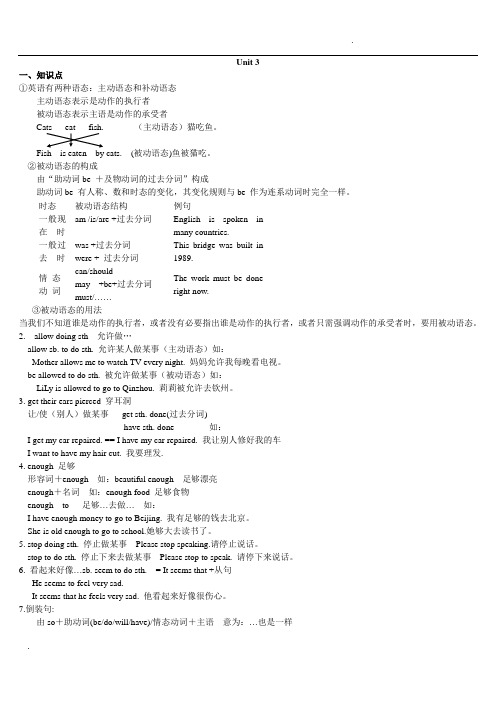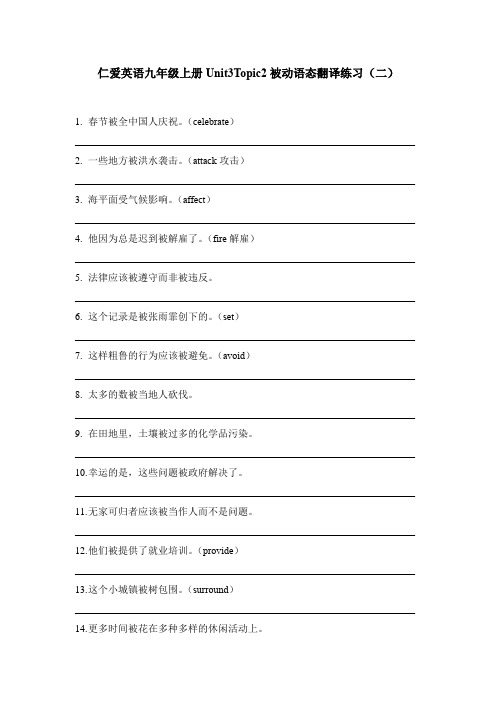九年级英语上册unit3_被动语态
新目标英语九年级Unit 3教学笔记

Unit 31. (1) allow doing sth.“允许干某事,准许”They don’t allow smoking here.They don’t allow drawing on the wall.(2) allow sb. to do sth.“允许某人干某事”They allowed her to go to the meeting.My mother will allow me to go to the cinema.变成被动语态:She was allowed to go to the meeting.I will be allowed to go to the cinema.(3) allow sb. sth. = allow sth. to sb.“使某人得到…”He allows his son 100 dollars every month.= He allows 100 dollars to his son every month.2. (1) make / have / let …do…get…to do…都表示“使(要,让)宾语做…”,与宾语有主动关系He made me stay with him.What can make you learn English well?We can’t have the car stop.I would have you buy a new bike.He couldn’t get the car to start and went by bus.You should get your friends to help you.After writing the letter, I got my brother to post it.(2) get / have + 宾语 + 动词过去分词表示“主语使得别人做了某事”与宾语有被动关系I’ll go and get my hair cut (过去分词).My watch is broken; I’ll get it mended.I’ll have my hair cut tomorrow.They have just had their car repaired.(3) 当make用于被动语态中时,不定式必须带toThey made her stay for dinner. (动词原形)She was made to stay for dinner.She was made to wait for hours.3. (1) own形容词“自己的”用在所有格后加强语气I saw it with my own eyes.Please describe this picture in your own words.one’s own + 名词 = 名词+ of one’s own“某人自己的…”This is my own house.= This house is my own.That’s my (own) bike.= That’s a bike of my own.(2) own动词“拥有,所有”Many people own cars now.(3) owner名词“所有者,拥有人,主人”Who is the owner of this house?He used to own this car.= He used to be the owner of this car.(4) oneself表示“某人自己本身”You must look after yourself.(5) on one’s own“独立地,自愿地”I did that thing on my own.4. (1) stop to do sth.“停下手头所做的事去做另一件事”He stopped to have a look at the boy.(2) stop doing sth.“停止做正在做的事”Why did he stop talking?(3) stop sb. from doing…“阻止某人做某事”The workers had to work for hours to stop the ship from going down.(4) can’t stop doing sth. “忍不住…,无法不…”I couldn’t stop laughing when I heard it.5. (1) need to do sth.“需要做某事”Your parents aren’t at home; you need to cook by yourself today. We need to wear cool clothes in summer.注意:This pair of shoes needs mending.(表被动关系)(2) There is no need to thank me.need为不可数名词“需要,必要,缺乏”There is no need to worry about her.There is no need to set off so early.(3) There is no need (for sb.) to do sth.= It is not necessary (for sb.) to do sth.“没有必要…”There is no need to come so early.=It’s not necessary to come so early.There is no need for you to finish the work today.=You don’t have to finish the work today.(4) There is no need of / for…There is no need of / for money.There is no need of / for hurrying.6. (1) so + be / 助动词 / 情态动词 + 主语表示“另一个主语也…”Lucy finished her homework, so did Lily.Li Mei was late. So were you.If you can finish it in time, so can we.If you go to the cinema tonight, so shall I.(从句用一般现在时代替一般将来时)Tom speaks French. So do I. So does his brother.A: I went to the cinema yesterday.B: So did I.(2) Neither / Nor + be / 助动词 / 情态动词 + 主语表示“另一个主语也不…”Bob didn’t come to school yesterday. Neither / Nor did Tom. If you don’t go, neither / nor will I.(3) so + 主语 + be / 助动词 / 情态动词表示“主语确实…”赞成前一种说法He is a clever boy. --- So he is.Tom hopes to be a teacher. --- So he does.7. by + 时间表示“不迟于,到…为止,到…之时”(1) By the end of last year we had planted 3000 trees.(2) We have learned about 1500 English words by now.(3) By this time tomorrow I will have finished the work.8. concentrate“集中(注意力,精神等),专心,全神贯注于…”常与介词on / upon连用I must concentrate on my new job.I can’t concentrate upon my work when I’m hungry.The terrorists concentrated their activities on the big cities. Mike concentrates more on the computer than his studies.9. (1) keep doing sth. “继续做某一相同的动作”之间无停顿,表示状态和动作的持续He kept telling me to be careful on the trip.He kept standing there for an hour without moving.(2) keep on doing sth. “经过一段时间的间隙后继续做同一件事”强调动作的反复He kept on teaching as though nothing had happened.They kept on working in the field, though it was raining.(3) keep … doing sth.“使…处于做某事的状态”I’m sorry to keep you waiting for a long time.The teacher kept him standing there for an hour.(4) keep … from …和keep … from doing …表示“阻止(防止 / 避免)某事的发生或某人做某事” from不可省略I mustn’t keep you from your work.我不该打扰你的工作.I tried to keep him from going out.You should keep your room from getting dirty.10. (1) perform“表演,演出”The tigers performed well at the circus.perform a part in a play(2) perform“执行,履行”I have performed all my duties.11. (1) would like to do sth.would most like to do sth.I’d like to improve my English.What kind of food would you most like to eat?(2) feel like doing sth.= would like to do sth.= want to do sth. “想要做某事”She feels like watching TV.= She would like to watch TV.I want to have a trip to Tibet.(3) want doing sth. “需要干某事”用主动结构表示被动关系My watch wants (needs) mending.12. (1) decide + 名词 / 代词I can’t decide the date of the trip.(2) decide (not) to do sth.They decided to stay here.The girl decided not to be a nurse.decide相当于make up one’s mind“下定决心,打定主意”I’ve made up my mind to go abroad for further study.We have made up our minds that we will never make the same mistake any more.(3) decide + 疑问代词 / 副词 + 动词不定式Have you decided where to go yet?(4) decide + 从句Let’s first decide where we will go next?We decided (that) we didn’t take part in the football match.It’s difficult to decide who is right.13. (1) volunteer动词“自愿,自愿服务”He volunteered to do the work.Jenny volunteered to clean up the classroom.He volunteered for guard duty.(2) volunteer名词“志愿者”Who can have a volunteer to collect the glasses?Any volunteers?14. (1) I wish you success!The meeting was a great success.(2) She succeeded as a teacher.Did he succeed in solving the money problem?(3) The operation(手术) was quite successful.He was successful in his business.(4) Our country has sent up many satellites into space successfully.15. (1) get in the (one’s) way “妨碍”Computer games can get in the way of your schoolwork.The heavy rain got in our way of having the sports meeting.(2) get … out of the (one’s) way “使…不妨碍某人的路”We have to get the stones out of our way.16. (1) 主语(物) + happen + to sb./ sth.“某人(物)发生…”The accident happened this morning.I wondered what had happened to him.What’s happening to the forest?If anything happens to him, let me know.(2) 主语(人) + happen to do sth. “某人碰巧、恰巧做某事”She happened to go / be out when I phoned her.I happened to see him on the street.It happened that I saw him in the reading room.(3) happen强调“事情的偶然性发生”happen --- take place指“经过安排,筹划的有计划发生”The Olympic Games take place every four years.Great changes have taken place in our country.The dance will take place on Saturday night.When will the meeting take place?17. (1) sleep名词和动词“睡觉”He had a good sleep. (名词)Last night I slept very well. (动词)(2) asleep形容词“睡着的”只用作表语The child has been asleep.若表示“睡着的”作定语修饰名词用sleeping 如:the sleeping dog(3) sleepy形容词“困乏的,想睡觉的”I feel very sleepy now.标签: 教学笔记 .。
人教版九年级英语第三单元知识点梳理

人教版九年级英语第三单元知识点梳理Unit 3 Could you please tell me where the restrooms are?一、短语:1.make a telephone call打电话2.save money省钱、存钱3.from time to time时常、有时4.turn red变红5.take up开始做6.deal with对付、应付7.go straight向前直走8.tons of attention很多关注9.on the beach在海滩上10.be careful当心11.hang out闲逛12.in a way在某种程度上13.dress up as打扮成14.a very small number of…极少数的…15.be alone独处16.give a speech做演讲二、知识点:1.①问路常用的句子:Do you know where is…?你知道...在哪里吗?Can you tell me how can I get to…?你能告诉我我如何能到达...吗?Could you tell me how to get to…?你能告诉我如何到达...吗?②Can/Could/Will/Would you please tell me sth?你能告诉我某事吗?(表示十分客气地询问)③Could you tell me how to get to the park?你能告诉我怎么去公园吗?上面句子中的how to get to the park是疑问词与动词不定式连用,用作宾语,但不是宾语从句,相当于how I can get to the park(宾语从句)。
2.日常交际用语:①take the elevator/escalator to the…floor:乘电梯/自动扶梯到…楼。
②turn left/right=take a left/right:向左/右转。
新目标九年级Unit_3_被动语态

2.含有宾语补足语的句子的被动语态 keep, make 三类的动词常常有宾语补足 语, 在被动语态中,宾语补足语位置不变。 We keep food fresh in the fridge. 主 谓 宾 宾补 -Food is kept fresh in the fridge. I saw him go into the office building. -He was seen to go into the office building.
• Lucy does the homework in the evening.
The homework is done by Lucy in the evening.
• They often use computers in class.
Computers are often used by them in class.
is / am / are + being +过去分词
1.Some workers are painting the rooms now.
The rooms are being painted by some workers now.
2.He is watching TV.
TV is being watched by him.
came--come did--done drank--drunk ate--eaten made--made said--said found-found got--got began-begun left-left
被动语态的结构
不同的时态有不同的被动语态结构 1.一般现在时的被动语态结构:
助动词is, are+及物动词的过去分词
初中英语 仁爱版九年级上册Unit3 Topic1知识点

Unit3 Topic1Section A1.You can stick it on the wall.你可以把它粘在墙上。
(1)stick(动词)粘贴,粘住Eg:Please stick this map of China on the wall.请把这张中国地图粘在墙上。
(2)stick(名词)木棒,木棍,枝条walking stick拐杖(3)stick to sth.坚持,坚守(某种观点、主张、理想、真理、协议)Eg:He always sticks to his own decision.他总是坚持他自己的决定。
(4)stick to doing sth.坚持做某事Eg:He sticks to speaking English every day.他坚持每天说英语。
2.Guess what!猜猜看!3.character人物,字体,性格特征4.Disneyland is enjoyed by millions of people from all over the world.世界上数百万的人都喜欢迪士尼乐园。
(1)is enjoyed被喜欢,是一般现在时的被动语态结构。
(2)by被(由)...,放在句子的后面,特别强调动作或行为的执行者。
5.I hope I can go there one day.我希望有朝一日能去那儿。
one day表示过去或将来的某一天,意为“(过去)有一天,(将来)有朝一日”。
Eg:One day you will understand.总有一天你会明白的。
One day a little monkey was playing by the river.有一天,一只小猴子在河边玩耍。
some day一般只表示将来的某一天,即“有朝一日,总有一天”。
Eg:Some day he will be famous.总有一天他会成名的。
6.Are you ready for your trip?你为旅行准备好了吗?(1)be ready for sth.为某事准备好Eg:The famous singer is ready for the concert.这个著名的歌手已经准备好演唱会。
九年级英语 Unit 3 Teenagers should be allowed to choose their own clothes. 讲解与练习

第 1 页 (共4 页) 第 2 页 (共4 页)学校 姓名 班级 考场 考号---------------------------------○密------------------ -------------------○封----------------------------- -- --○线----------------------------※※※※※※※※※※※※※※※答※※※※※※※※※※※※※※※※※※题※※※※※※※※※※※※※※※※线※※※※※※※※※※※※※九年级英语 Unit 3: Teenagers should be allowed tochoose their own clothes. 讲解与练习重点短语take the test 参加考试 pass the test 通过考试 fail a test 考试失败be strict with+人 对某人严格be strict in+事物 对某事要求严格stay up 熬夜have an opportunity to do sth.有机会做某事=have a chance to do/ of doing every other day 每隔一天 (每两天)clean up 打扫 整理learn from each other 互相学习concentrate on 专注于 one’s own 某人自己的the other day 前几天,几天前 = a few days ago= every two days at present 现在,目前 in this way 用这种方法in the way 挡道的,妨碍人的on the way 在路上 on one’s way to 在某人去…的路上 by the way 顺便说(问)be serious about 对…认真care for 在乎、关心 【语言点】1. Teenagers should be allowed to choose their own clothes.应该允许青少年选择自己的衣服。
九年级英语第三单元语法总结完整版

Unit 3一、知识点①英语有两种语态:主动语态和补动语态主动语态表示是动作的执行者被动语态表示主语是动作的承受者Cats eat fish. (主动语态)猫吃鱼。
Fish is eaten by cats.(被动语态)鱼被猫吃。
②被动语态的构成由“助动词be +及物动词的过去分词”构成助动词be 有人称、数和时态的变化,其变化规则与be 作为连系动词时完全一样。
时态被动语态结构例句一般现在时am /is/are +过去分词English is spoken inmany countries.一般过去时was +过去分词were + 过去分词This bridge was built in1989.情态动词can/shouldmay +be+过去分词must/……The work must be doneright now.③被动语态的用法当我们不知道谁是动作的执行者,或者没有必要指出谁是动作的执行者,或者只需强调动作的承受者时,要用被动语态。
2. allow doing sth 允许做…allow sb. to do sth. 允许某人做某事(主动语态)如:Mother allows me to watch TV every night. 妈妈允许我每晚看电视。
be allowed to do sth. 被允许做某事(被动语态)如:LiLy is allowed to go to Qinzhou. 莉莉被允许去钦州。
3. get their ears pierced 穿耳洞让/使(别人)做某事get sth. done(过去分词)have sth. done 如:I get my car repaired. == I have my car repaired. 我让别人修好我的车I want to have my hair cut. 我要理发.4. enough 足够形容词+enough 如:beautiful enough足够漂亮enough+名词如:enough food 足够食物enough to 足够…去做…如:I have enough money to go to Beijing. 我有足够的钱去北京。
九年级英语上册unit3_被动语态

5. We should make our country become more and more beautiful. → Our country more and should be made to become more beautiful.
如:belong to, happen, take place, last 等。
What happened to her yesterday ?
That bike doesn’t belong to Mike.
2). 连系动词(Link.v.)不用被动语态。 get = become , feel , smell , taste , look = seem , sound ,turn等。 The fish tastes good.
Tom will clean the room tomorrow.
主
谓
宾(受动者)
The room will be cleaned by Tom tomorrow.
一般将来时;will be+动词的过去分词
3.Amy can take good care of Gina . Gina can be taken good care of by Amy.
主语
speak
谓语
English.
宾语 主动语态
English is spoken
主语 谓语
by us.
宾语
被动语态
当主语是动作的执行者时,动词用主动语态 (Active Voice);如果主语是动作的承受者, 动词便用被动语态(Passive Voice)。 We cleaned the classroom yesterday. 昨天我们打扫了教室。 The classroom was cleaned by us yesterday. 昨天教室被我们打扫了。
仁爱英语九年级上册Unit3Topic2被动语态翻译练习(二)

仁爱英语九年级上册Unit3Topic2被动语态翻译练习(二)1.春节被全中国人庆祝。
(celebrate)____________________________________________________________________ 2.一些地方被洪水袭击。
(attack攻击)____________________________________________________________________ 3.海平面受气候影响。
(affect)____________________________________________________________________ 4.他因为总是迟到被解雇了。
(fire解雇)____________________________________________________________________ 5.法律应该被遵守而非被违反。
____________________________________________________________________ 6.这个记录是被张雨霏创下的。
(set)____________________________________________________________________ 7.这样粗鲁的行为应该被避免。
(avoid)____________________________________________________________________ 8.太多的数被当地人砍伐。
____________________________________________________________________ 9.在田地里,土壤被过多的化学品污染。
____________________________________________________________________ 10.幸运的是,这些问题被政府解决了。
- 1、下载文档前请自行甄别文档内容的完整性,平台不提供额外的编辑、内容补充、找答案等附加服务。
- 2、"仅部分预览"的文档,不可在线预览部分如存在完整性等问题,可反馈申请退款(可完整预览的文档不适用该条件!)。
- 3、如文档侵犯您的权益,请联系客服反馈,我们会尽快为您处理(人工客服工作时间:9:00-18:30)。
The room is going to be cleaned by Tom tomorrow
• We will hold a sports meeting next week.
A sports meeting will be held by us next week.
• Children will take some photos in the schoolyard tomorrow.
6.现在完成时的被动语态的结构
have / has +been +过去分词
1.We have made a key.
A key
has been made
by us.
2.We have finished our compositions.
Our compositions have been finished by us.
5. -Do you like the skirt ? -It _______ soft. A. is feeling B. felt C. feels D. is felt 6. Are you still here ? You were here an hour ago . Who ________ for ? A. are you waiting B. did you wait C. were you waiting D. do you wait
• They built the tall building last year.
The tall building was built by them last year.
• He took good care of his little brother yesterday.
His little brother was taken good care of by him yesterday.
填空(完成被动语态填空) Practice 1. They often clean their classroom after school . (改为被动语态) is cleaned Their classroom _____ often ______ by them after school. 2. Li Lei gave Tom a new pen last week . (同上) was given by A new pen _____ _______ _____ Tom last week .
3. A lot of people in China can speak English now . (同上) can be spoken English ______ ____ ______ by a lot of people in China now. 4. I have learned English for about two years. (同上) has ______ ______ English ______ been learned for about two years. 5. They will read these story-books next month. (同上) will be _____ These story-books _____ _____read next month.
3.You must turn off the lights.
The lights must be turned off by you.
4.They should learn English well.
English should be learned well by them.
5.现在进行时的被动语态的结构
时态
被动语态结构
一般现在时 am/is/are done 表格:被动态基本结构
一般过去时
现在进行时
过去进行时 一般将来时 现在完成时
was/were done am/is/are being done was/were being done be going to/will be done have/has been done
3.一般将来时的被动语态结构:
be going to be/will be+过去分词
1.They will finish the work in ten days.
The work will be finished by them in ten days.
2.Tom is going to clean the room tomorrow.
Some photos will be taken by children in the school tomorrow.
The headmaster is going to give a talk this afternoon.
A talk is going to be given by the headmaster this afternoon.
语态
语态:表示主语和谓语动词之间的关系。 英语有两种语态,即主动语态和被动语态。 主动语态:表示主语是动作的执行者。 被动语态:表示主语是动作的承受者。 如: Many students study English.(主动语态) English is studied by many students. (被动语态)
He is made
to work for 10 hours.
4.过去分词做后置定语,表示被动
a boy called Tom 一个叫Tom的男孩
a book bought yesterday 一本昨天买的书
5.过去分词做宾补,表示被动
get/make/have sth done 使某物被… make me understood 使我被理解/使人理解我
完成下列句子: was 1.Our school _____
opened ____in 2002.(开办) be looked after 2.The young trees must____ ____ ______ well.
(照顾) Was built 3. _____ this building_________(建成)last year? was written 4.The book _____ _______(写)by him last year. wasn’t built 5. The bridge _______ _______(不建造)in1989.. be ______ 6.The 29th Olympic Games will____ held (举行) in UK in 2012.
被动语态的几种类型
1.带双宾语句子的被动语态.(指物的宾语叫直接 宾语,指人的宾语叫间接宾语)
give me a book = give a book to me
间 直
如:1.He gave me a book. -I was given a book by him. -A book was given to me by Tom. 2. I bought him a book. -He was bought a book by me. -A book was buoght for him by me.
• They play football on Sunday.
Football is played by them on Sunday.
• Lucy does the homework in the evening.
The homework is done by Lucy in the evening.
• They often use computers in class.
Computers are often used by them in class.
• We make these machines in Beijing.
These machines are made in Beijing.
2.一般过去时的被动语态结构:
have my hair cut 使我头发被剪/请人给我剪头
6.不能用于被动语态的几种情况
1)当主动结构中的宾语是反身代词和相互代
词时,不能改为被动语态。 We often help each other. 2)have, take place ,happen feel感觉起来,look 看起来,sound, taste, smell不用于被动 如: I have a bike. An accident happened to him. The music sounds beautiful.
3.感官, see , make , let ,这些词在 主动句中,其后的动词不加to,但变被动 句时必须加to.
1.I saw him play basketball last Sunday. He was seen to play basketball last Sunday. 2.The boss makes him work for 10 hours.
More water should be drunk by you.
1.He can take care of the baby.
The baby can be taken care of by him.
2.Lucy may draw the pictures.
The picture may be drawn by Lucy.
被动语态的结构
助动词be+过去分词 (be + done)
1.一般现在时的被动语态结构:
is/are+过去分词
1.Many students study English. English is studied by many students.
